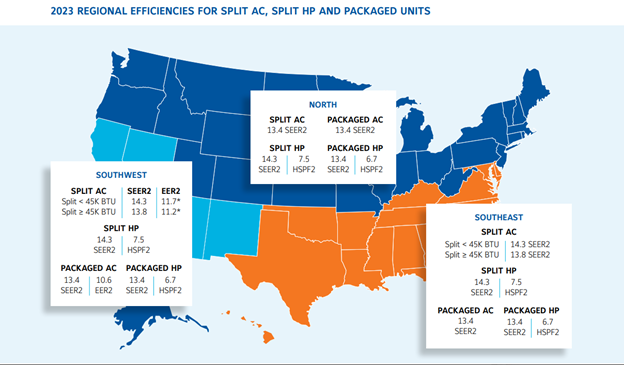
2023 Efficiency Requirements for Air Conditioning Systems– What You Need to Know
New regulations from the DOE go into effect on January 1, 2023, that address minimum efficiency and new test procedures for air conditioning systems.
With a new year just around the corner, new regulations, updates and code developments are in tow. It is important for code officials and the building safety community to be aware of these changes and what new efficiency requirements will be required in 2023.
As subject matter experts for the International Code Council, we have been dedicated to monitoring the development of new regulations and efficiency requirements for air conditioning systems. From our discussions with stakeholders throughout the industry, these are the updates you should know for the coming year.
When to Be on the Lookout for the New Efficiency Requirements for Air Conditioning Systems
New regulations from the Department of Energy (DOE) go into effect on January 1, 2023, that address minimum efficiency and new test procedures for air conditioning systems. These new regulations affect code compliance for mechanical equipment regardless of what state or local code edition has been adopted because federal appliance standards preempt state and local construction codes. DOE’s requirements apply differently in specific regions of the United States (North, Southwest, and Southeast).
The development of these new regulations began in 2014 with a DOE request for information (RFI) regarding central air conditioners and heat pumps to solicit comments on whether to amend the current energy conservation standards for consumer central air conditioner and heat pump products. The RFI resulted in a formal request from industry members for DOE to convene a negotiated rulemaking to address potential amendments. As a result of the negotiated rulemaking, on January 6, 2017, DOE published a direct final rule to establish new energy conservation standards for residential central air conditioners and heat pumps with an effective date of January 1, 2023.
Efficiency Requirements and Test Standards in the International Codes
Efficiency requirements and test standards are articulated in the commercial energy portions of the 2021 International Energy Conservation Code (IECC). The minimum efficiency requirement tables in Chapter 4 of the IECC are listed with before and after January 1, 2023, requirements along with modified testing procedures. The commercial IECC requirements provide discretion to the code official as to the timing of their application (e.g., at permit issuance, plan approval, inspection, etc.).
The energy and residential codes defer to federal law concerning equipment efficiency ratings:
Equipment sizing and efficiency rating. Heating and cooling equipment shall be sized in accordance with ACCA Manual S based on building loads calculated in accordance with ACCA Manual J or other approved heating and cooling calculation methodologies. New or replacement heating and cooling equipment shall have an efficiency rating equal to or greater than the minimum required by federal law for the geographic location where the equipment is installed.
Adopted IECC provisions addressing instances not covered within DOE’s regulations remain effective.
Efficiency Requirements for Air Conditioning Systems within DOE’s New Regulations
DOE’s new regulations require additional energy efficiencies and updated testing procedures related to air conditioning systems. Some practical examples of changes effective January 1, 2023, would have the seasonal energy efficiency rating (SEER) for residential split air conditioning systems < 45kBtu/h for the Northern region moving from 13.0 SEER to 14.0 SEER or 13.4 SEER2 (an updated version of the SEER calculation); in the Southeastern region from 14.0 SEER to 14.3 SEER2, and in the Southwestern region from 14.0 SEER and 12.2 EER (Energy Efficiency Ratio) to 14.3 SEER2 and 11.7 EER2 (EER using different test conditions). The new testing protocols account for the lower SEER2 and EER2 ratings. Unlike split system and packaged air conditioning systems, split system and packaged heat pump SEER2 and HSPF2 (Heating Seasonal Performance Factor) ratings are standard throughout the US, regardless of region.

One complication to the enforcement of the new efficiency and testing standards is when and where these new standards apply. The lower SEER-rated equipment cannot be manufactured on or after January 1, 2023. In the Northern region, any 13.0 SEER AC equipment manufactured before January 1, 2023, can still be installed after January 1. In the Southeast and Southwest regions, split system air conditioning systems manufactured before January 1, 2023, cannot be installed on or after January 1, 2023, unless they meet the new standards. Per DOE’s definition, “installation of a central air conditioner” means the connection of the refrigerant lines and/or electrical systems to make the central air conditioner operational.
DOE does allow the sell-through of already manufactured commercial products compliant with current efficiency requirements. In addition, the sell-through of all residential heat pump systems is permitted.
In the northern region, verification of equipment compliance with DOE efficiency requirements will be based on the date of manufacture of the equipment and the seasonal efficiency rating shown on the equipment EnergyGuide label. Products manufactured prior to January 1, 2023, will have either an EnergyGuide label with SEER or SEER/EER ratings or an EnergyGuide label with SEER2 or SEER2/EER2 ratings (based on which DOE testing procedure was used). Due to the sell-through allowance in the northern region, either label is permitted. Products manufactured on or after January 1, 2023, must have an EnergyGuide label with SEER2 or SEER2/EER2 ratings.
Challenges and Considerations for Southeast and Southwest Building Safety Professionals
In the Southeast and Southwest regions and based on the DOE definition of the installation of a central air conditioner, all equipment not operational on January 1, 2023, must have an EnergyGuide label identifying a SEER2 or SEER2/EER2 rating. Strict compliance will be more challenging in that installation and inspections of mechanical equipment do not necessarily align neatly with the construction process. Code officials, typically, do not verify installation dates.
Consequently, DOE’s new regulation could create challenges where a project has been permitted in 2022 with a mechanical inspection not scheduled until 2023. In such circumstances, code officials could (1) request a signed statement from the builder/contractor confirming the installation date preceded 2023; (2) consider 2021 IRC R104.11 (Alternate materials) that allows a permit revision to not be required when equipment that meets or exceeds new federal minimums is installed; or (3) for projects following a simulated performance path approach where the proposed design specifies equipment above 2022 federal minimum efficiency requirements, permit such a design where the equipment that exceeds the 2022 requirements would also satisfy the 2023 requirements through a demonstration of equivalence.
To minimize challenges during this transition, code departments should also consider awareness initiatives for building industry members to alert them to the forthcoming DOE requirements and to inform them about how the code department will handle instances where a project is permitted in 2022 with the mechanical inspection taking place in 2023. The combination of industry outreach and the options suggested above can help ensure compliant installations on or after January 1.
The Code Council is Here to Help
Given resource and timeline considerations in the current economic environment, preparing ahead of the deadline is important in helping to resolve challenges for both code officials and the home-building community. Understanding when and where the new standards apply and what challenges to anticipate based on location will help the industry proactively address awareness initiatives to prepare communities for a smoother transition.
The Code Council’s PMG team is available to discuss and provide more information on these new requirements. Learn more at iccsafe.org/pmg.
For more information, you can also contact advocacy@iccsafe.org









